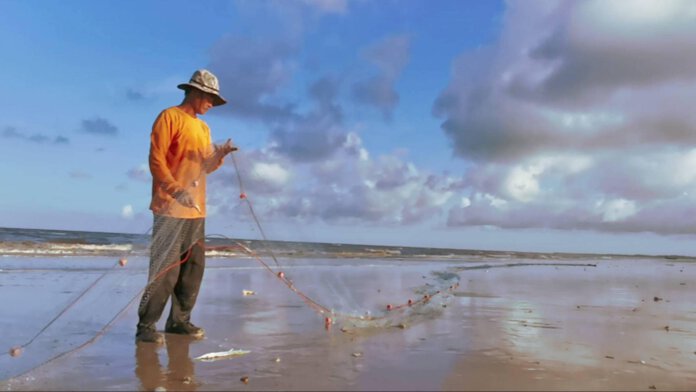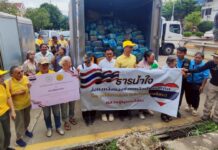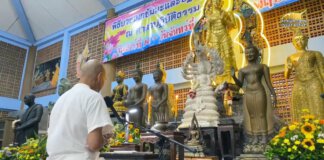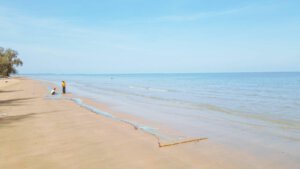

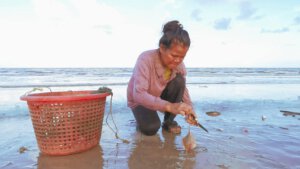
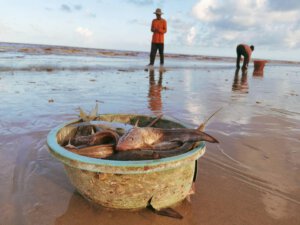
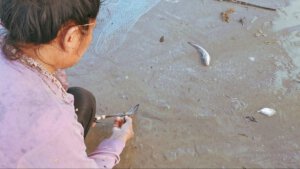
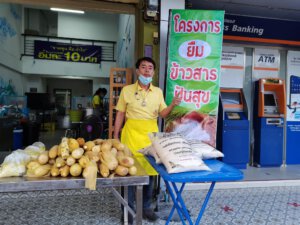
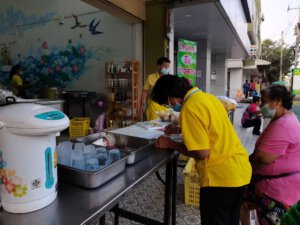
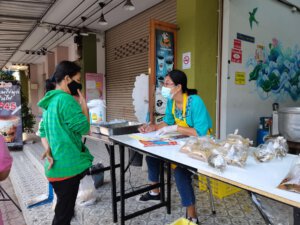
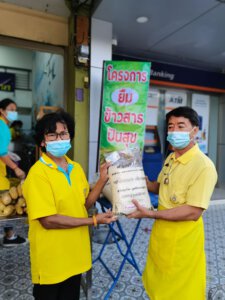
เดินออกกำลังกาย เห็นชาวบ้านนำตาข่ายมาช่วยกันลากจับปลา สองคนผัวเมีย
เลยเข้าไปพูดคุย สอบถามสารทุกข์สุขดิบ
ถามเขาว่า บ้านอยู่แถวนี้หรือ
เขาตอบว่า ไม่ อยู่บนควน (บนเขา)
ถามว่า ทำอาชีพอะไร
เขาตอบว่า รับจ้างก่อสร้าง
ถามว่า วันนี้ไม่ทำงานหรือ
เขาตอบว่า งานไม่มีมาเป็นเดือนแล้ว เพราะไม่มีใครจ้าง
ถามว่า แล้วที่บ้านอยู่กันกี่คน
เขาตอบว่า อยู่กัน ๔ คน พ่อ แม่ และ ลูกชายหญิงอีก ๒ คน
ถามว่า เมื่อไม่มีงาน แล้วจะเอาอะไรกินกัน
เขาตอบว่า เรื่องกับข้าว ก็ยังพอหาได้จากป่าจากทะเล แต่ข้าวสารนี่สิ บางมื้อก็ไม่มีหุง เงินก็ไม่มี ต้องไปยืมข้าวสารเพื่อนบ้านมาหุงกินกันตายไปก่อน
ถามเขาว่า แล้วปลาที่จับได้นี่หละ เอาไปกินหรือเอาไปขาย
เขาตอบว่า คงต้องเอาไปขาย เพราะข้าวสารไม่มี มีข้าวยังพอจะคลุกกะปิน้ำปลาให้ลูกกินได้
ฟังแล้วก็รู้สึกได้ว่า คนชนบทที่ไม่มีที่ทำกิน ไม่มีไร่ ไม่มีนา ไม่มีความรู้ เอาแต่รับจ้าง ก็ไม่ต่างอะไรกับการฝากชีวิตไว้กับคนอื่นล้วนๆ
เลยให้เจ้านัดไปหาเงินมาช่วยเขาซื้อปลาและกุ้ง สั่งให้จ่ายเขาไป ๕๐๐ ซึ่งจริงๆ แล้วปลากุ้งที่เขาจับได้ ไม่มาก หากจ่ายตามปริมาณปลากุ้ง คงได้แค่ ๑๐๐ เท่านั้น แต่ก็ไม่อยากทำให้เขารู้สึกว่า เราไปด้อยค่าเขา เห็นเขาเป็นขอทาน
จึงจ่ายค่าปลาแพงหน่อย
พอกลับมาจึงโทรคุยกับเจ้าตั้ม ให้พิมพ์ป้ายข้อความว่า “โครงการยืมข้าวสารปันสุข” ไปติดไว้ตามร้านอิ่มละ ๑๐ บาท ซึ่งช่วงเช้ายังมีการจัดให้มีการแจกอาหารอยู่ทั้ง ๔ สาขา
โดยหวังว่า ผู้คนที่ยังยากลำบาก จะสามารถมาหยิบยืมข้าวสารที่ วัดอ้อน้อย และมูลนิธิธรรมอิสระ พร้อมลูกหลาน ช่วยกันนำข้าวสารไปจัดตั้งให้ชาวบ้านเขาหยิบยืม เอาไปเลี้ยงชีวิตในช่วงเวลาที่สุดแสนจะยากลำบากเช่นนี้
โดนมีกติกาว่า ทุกคนที่มาหยิบยืม ต้องกรอกชื่อ ที่อยู่ และเบอร์โทรที่ติดต่อได้
และต้องแจ้งว่า ข้าวสาร ๕ กิโล ที่หยิบยืมไป เขาจะหุงกินได้กี่วัน เมื่อหมดแล้ว ก็สามารถมาหยิบยืมได้อีก แต่ต้องไม่เกิน ๕ ครั้ง
ภายในห้าครั้งๆ ละ ๕ กิโลนี้ เขาจะต้องส่งคืนมาบ้าง เพื่อนำไปให้ผู้อื่นหยิบยืมต่อ
อีกทั้งโครงการ ให้ยืมข้าวสารปันสุข นี้น่าจะช่วยบรรเทาความทุกข์ยากเดือดร้อน แก่พี่น้องที่ลำบากได้บ้าง ใครที่อยู่ไม่ไกลจาก วัดอ้อน้อย ก็สามารถมานำ ข้าวสารปันสุข ไปตั้งไว้หน้าบ้าน ให้คนมาหยิบยืมเอาไปหุงเลี้ยงชีวิตได้
พุทธะอิสระ
๑๑ กุมภาพันธ์ ๒๕๖๔
————————————————-
In this very difficult situation, we should do whatever we can to help.
February 11, 2020
While going for a walk, I saw villagers using nets to catch fish. They were husband and wife.
So, I went to talk to them and asked how they were doing.
I asked, “Do you live in this neighborhood?”
They replied, “No, in the mountain.”
I asked, “What are your jobs?”
They replied, “Construction laborer.”
I asked, “Are you not working today?”
They replied, “I have got no work for a month. Nobody hires.”
I asked, “How many people are in your family?”
They replied, “Four, we have got two children, a boy and a girl.”
I asked, “When you don’t have job, how can you make a living?”
They replied, “We can find some vegetable and meat from the forest and the sea. The problem is rice. In some meals, we do not have rice. We haven’t got any money. So, to survive, we have to borrow rice from our neighbors.”
I asked, “What about the fish that you have caught? Will you eat or sell them?
They answered, “We probably have to sell, because we don’t have rice. If we have rice, we can eat it with shrimp paste or fish sauce.”
Listening to them, I felt that rural people who have no land, no farm, no rice field, no education, and live on their labor, are totally dependent on others.
So, I told Nut to get some money to buy their fish and shrimp. I told Nut to pay them 500 Baht. In fact, their fish and shrimp would cost only about 100 Baht. However, I did not want to make them feel that we were devaluing them or seeing them as beggars. Therefore, we paid them higher.
When I came back, I called Tum and tell him to print the signs “Rice Borrowing, Happiness Sharing Project”. The signs were put at the “10 Baht Per One Meal” almshouses. In the morning, we still distribute meals at four locations.
We hope that people who live in difficulty can borrow rice from the Onoi Temple and the Dhamma Isara Foundation. My disciples have brought rice for people to borrow and make a living in the most difficult time like this.
There is a condition that everybody that borrows rice must fill out their name, address, and telephone number.
They must inform how many days they plan to live on the borrowed rice. When they run out of rice, they can borrow again, but no more than five times.
And during five times of rice borrowing, five kilograms each, they must return some so that other people can borrow rice.
The “Rice Borrowing, Happiness Sharing” project should help relieve some suffering of people. Those whose houses are not far from the Onoi Temple can share their rice by putting them in front of their houses so that other people can borrow to make their living.
Buddha Isara


